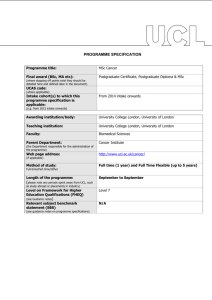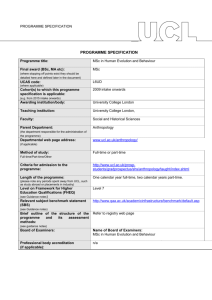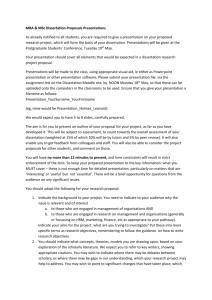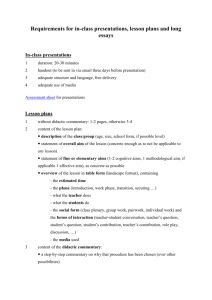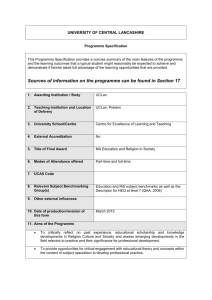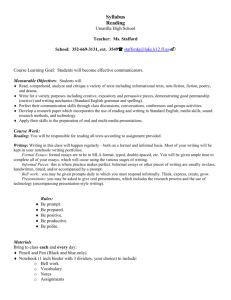MSc Audiovestibular Medicine
advertisement
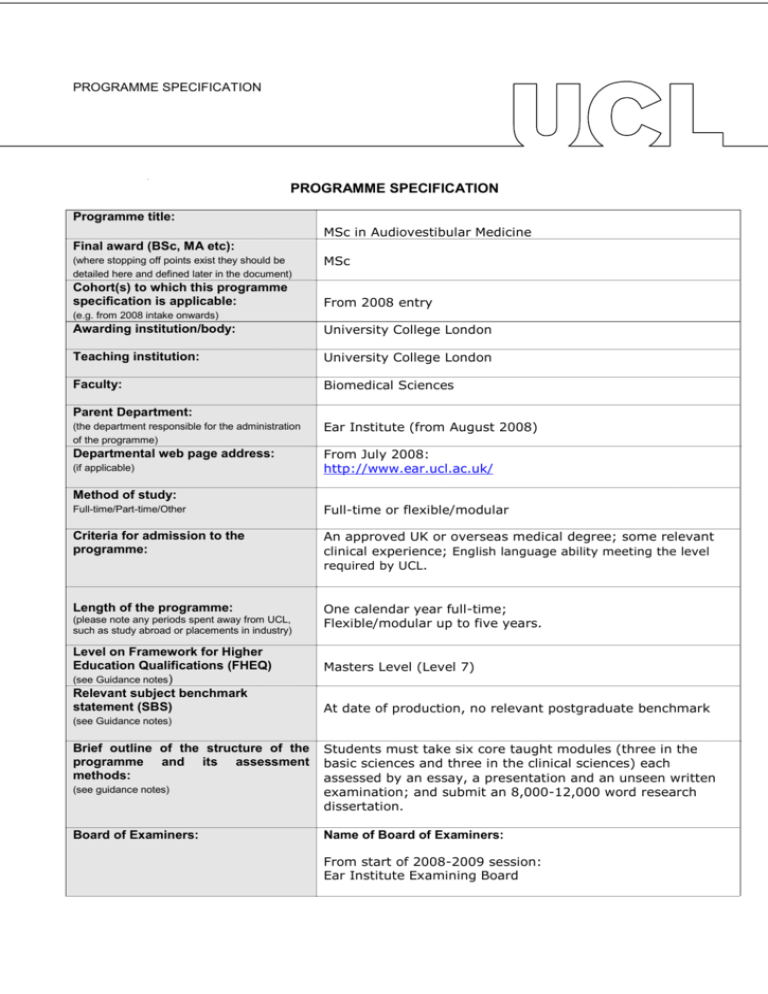
PROGRAMME SPECIFICATION PROGRAMME SPECIFICATION Programme title: MSc in Audiovestibular Medicine Final award (BSc, MA etc): (where stopping off points exist they should be detailed here and defined later in the document) Cohort(s) to which this programme specification is applicable: MSc From 2008 entry (e.g. from 2008 intake onwards) Awarding institution/body: University College London Teaching institution: University College London Faculty: Biomedical Sciences Parent Department: (the department responsible for the administration of the programme) Ear Institute (from August 2008) Departmental web page address: From July 2008: http://www.ear.ucl.ac.uk/ (if applicable) Method of study: Full-time/Part-time/Other Full-time or flexible/modular Criteria for admission to the programme: An approved UK or overseas medical degree; some relevant clinical experience; English language ability meeting the level required by UCL. Length of the programme: One calendar year full-time; Flexible/modular up to five years. (please note any periods spent away from UCL, such as study abroad or placements in industry) Level on Framework for Higher Education Qualifications (FHEQ) (see Guidance notes) Relevant subject benchmark statement (SBS) Masters Level (Level 7) At date of production, no relevant postgraduate benchmark (see Guidance notes) Brief outline of the structure of the programme and its assessment methods: (see guidance notes) Board of Examiners: Students must take six core taught modules (three in the basic sciences and three in the clinical sciences) each assessed by an essay, a presentation and an unseen written examination; and submit an 8,000-12,000 word research dissertation. Name of Board of Examiners: From start of 2008-2009 session: Ear Institute Examining Board The teaching programme is recognised for specialty training by the Royal College of Physicians/Postgraduate Medical Education Training Board; and by the British Association of Audiological Physicians. Professional body accreditation (if applicable): Date of next scheduled accreditation visit: N/A EDUCATIONAL AIMS OF THE PROGRAMME: The programme aims to introduce students to the basic sciences underpinning the clinical practice of and research in audiovestibular medicine. Moreover, it aims to integrate the scientific and pathological aspects of audiovestibular medicine with the provision of a clinical service in both paediatric and adult auditory and vestibular disorders. PROGRAMME OUTCOMES: The programme provides opportunities for students to develop and demonstrate knowledge and understanding, qualities, skills and other attributes in the following areas: A: Knowledge and understanding Knowledge and understanding of: 1. The principles of physics, acoustics, statistics, anatomy, physiology and technology relevant to the auditory and vestibular systems. How to assess scientific evidence critically and synthesise data from original articles, textbooks and electronic sources. Pathology, diagnosis, investigation and management of audiovestibular disorders, using appropriate sources to ensure evidence-based medicine. Teaching/learning methods and strategies: Acquisition of (1) through taught lectures, including specific lectures on how to access evidence and teaching on evidence-based medicine/clinical governance. Students are required to attend lectures on how to write a paper, how to give a presentation, how to use the library, study widely on their own, and prepare essays for submission on each module of the course. 2. Subject-specific skills, for example, the practice and interpretation of auditory and vestibular test techniques and assessment of relevant epidemiological, public health, pathological and radiological data. Acquisition of (2) through attendance at clinics across the disciplines within audiovestibular medicine and/or continuing to undertake their permanent clinical position, integrating the practical aspects of the teaching into their clinical practice. 3. Relevance of audiological medicine at the primary, secondary and tertiary levels of health care. Acquisition of (3) through attendance at secondary and tertiary clinics. Assessment: Students will be assessed by a variety of methods: unseen examinations; long essays; scientific presentations; and clinical case presentations B: Skills and other attributes Intellectual (thinking) skills: Teaching/learning methods and strategies: a) the programme aims to help students to be precise, cautious in their interpretation of evidence, and to understand through practice, the concepts of evidence-based medicine/clinical governance; Acquisition of (a) and (b) is fostered by comprehensive review of necessary information, specific teaching and clinical governance, and presentation of conflicting views and arguments for and against perceived wisdom. b) evaluate standard teaching by reference to original source of material, re-appraisal and reassessment of evidence, writing reasoned essays and presenting scientific reviews/case presentations; c) development of research question, analysis of current state of knowledge and development of research programme. c) By submission of research dissertation and presentation of research seminar. Assessment: Students will be assessed by a variety of methods: unseen examinations; long essays; scientific presentations; clinical case presentations; research presentation; dissertation. C: Skills and other attributes Practical skills (able to): Teaching/learning methods and strategies: This programme aims to help students with the following practical skills: a) to communicate effectively in writing; a) through the writing of long essays and dissertations; b) improve their knowledge of evidence-based medicine; b) through lectures, reading and presentations c) use databases, word-processing programs and digital resources; c) through hands-on instruction and regular usage; d) give formal oral presentations on both scientific and clinical topics; d) through regular modular presentations; e) listen and discuss ideas introduced during such presentations; e) through regular discussion following each presentation; f) learn research techniques in a variety of specialised research units and institutes; f) through visits to libraries and academic/clinical units undertaking research in audiovestibular medicine; g) maintain a disciplined programme of learning and research over one or more years; g) through the setting of clear deadlines for the submission of work; h) choose their own research dissertation topic and undertake detailed library database research of the topic; h) through individual discussion of students’ proposals; i) apply their knowledge to their ongoing clinical practice. i) discussion of application of new knowledge/skills in context of their work. Assessment: These skills are all assessed by unseen examination, course work, long essays and dissertation. D: Skills and other attributes Transferable skills (able to): Teaching/learning methods and strategies: The programme will encourage students to a) write clear, well-structured essays and dissertations; a) long essays and research project dissertation; b) improve their practice of clinical evidence-based medicine; b) giving presentations and reading evidence-based medicine and original source documents, allowing evidence to be formulated; c) submitting word-processed written work using databases, consulting online library resources and using website material; e) contribute in group discussion; d) modular scientific and/or case presentations; f) e) discussion after presentations; f) reading topics from different medical perspectives in paediatric, geriatric, neurological, psychological, and audiological journals; g) essays, dissertation, presentation, clinical assessments, and library visits; h) evaluate novel material orally; h) discussion of new material at presentations; i) reflect on their own evaluation of differing and conflicting evidence; i) discussion; j) make original contributions to a specific area of audiological medicine; j) essays, dissertation, and discussions; k) essays, dissertations, and discussion assessment. c) use computer resources and information technology; d) present material orally; understand concepts that are controversial; g) study a variety of written and digital scientific material in libraries and research institutes that have often not been used by medical graduates unfamiliar with research; k) assess evidence for themselves, teaching learning methods and strategies. Assessment: Unseen examination, long essays and dissertation. The following reference points were used in designing the programme: the Framework for Higher Education Qualifications: (http://www.qaa.ac.uk/en/Publications/Documents/Framework-Higher-Education-Qualifications-08.pdf); the relevant Subject Benchmark Statements: (http://www.qaa.ac.uk/assuring-standards-and-quality/the-quality-code/subject-benchmark-statements); the curriculum in training in Audiological Medicine of the Royal College of Physicians; the programme specifications for UCL degree programmes in relevant subjects (where applicable); UCL teaching and learning policies; staff research. Please note: This specification provides a concise summary of the main features of the programme and the learning outcomes that a typical student might reasonably be expected to achieve and demonstrate if he/she takes full advantage of the learning opportunities that are provided. More detailed information on the learning outcomes, content and teaching, learning and assessment methods of each course unit/module can be found in the departmental course handbook. The accuracy of the information contained in this document is reviewed by the College and may be checked by the Quality Assurance Agency for Higher Education. Programme Organiser(s) Name(s): Professor Linda M Luxon Signature(s): (Linda M Luxon) Date of production: 11 September 2009 Date of review: October 2014 Date approved by Head of Department: October 2014 Date approved by Chair of Departmental Teaching Committee: Date approved by Faculty Teaching Committee October 2014 December 2014
